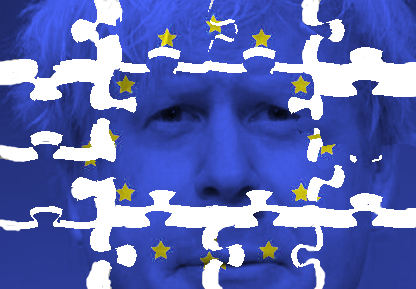
 In the aftermath of the referendum, the UK seems to be suffering from individual and collective leadership failure, write Mark Bennister and Ben Worthy. The use of fear tactics instead of thought-through strategies and of quick fixes instead of long-term visions are some of the reasons behind this failure.
In the aftermath of the referendum, the UK seems to be suffering from individual and collective leadership failure, write Mark Bennister and Ben Worthy. The use of fear tactics instead of thought-through strategies and of quick fixes instead of long-term visions are some of the reasons behind this failure.
Long-serving leadership is in short supply in the UK. The longest-serving party leader is now Plaid Cymru’s Leanne Wood, followed closely by the Green Party’s Natalie Bennett (who will be stepping down) and the SNP’s Nicola Sturgeon. With this short supply, we also now have a succession of political leaders avoiding responsibility: Cameron, Osborne, Johnson, Farage, and Corbyn. Leaders were complacent, with exaggerated beliefs in their electoral powers, in their political capital and in the machines they thought they led. But what exactly is it they failed to do?
On one level, leadership is fundamentally about winning and emerging victorious. Few losing leaders survive long. A leader must win something for the party or country, whether an election, a referendum or perhaps a policy victory. David Cameron will be remembered above all as a loser who gambled everything on a referendum. Corbyn also in some sense lost, less by some concrete failure but by the rather vaguer crime of ‘failing to fight hard enough’. Both were fooled by polls and analytics that have gone from being tools to political agents themselves.
No vision
Leadership, some argue, is also about selling a vision, what George HW Bush called the ‘vision thing’. Leaders need to ‘sell’, argue and cajole others to support their vision. They need to marshal the resources available to them, utilise them wisely and exert control. Cameron failed to sketch out any set of ideas, instead deploying a lacklustre fear tactic, having spent the last five years bashing and fighting the EU. A largely unexpected election victory in 2015 bolstered his personal belief in his electoral powers.
Corbyn also appeared to offer only grudging enthusiasm. From both leaders there was no grand idea or vision of the EU, but simply a rather flat persuasion that the status quo was better than the alternative. They faced a powerful Leave campaign, pushed by men predominantly to further their own political careers, reaping the benefits from a parallel UKIP campaign of dog whistle politics of the worst kind. The failure of leadership stems from an inability to see the reality of modern Britain. The Leave campaign, in a fact-free vacuum, exploited the deep anti-elite sentiment that had been building for decades and which united authoritarian cultural strains across class and geography.
Not teaching lessons
Erwin Hargrove offers the view that leadership is also about ‘teaching reality’: a leader must ‘help people face reality and mobilize them to make change’. Lyndon Johnson taught Americans of the need for equality while Churchill, for all his bluster, educated Britain as to the perils of the situation in the summer of 1940 when he reminded the country after Dunkirk that ‘Wars are not won by evacuations’. David Cameron failed to teach the UK about the EU or the reality of global migration. Indeed, fatally for Cameron, the referendum took place in an information-free – some would argue a reality-free – vacuum. Corbyn similarly failed to teach such a reality; or at least he spoke to the converted, avoiding those vital areas like the North-East or Wales where Labour votes were lost.
Disappointing everyone at once
Ronald Heifetz speaks of how leaders ‘disappoint their followers at a rate they can absorb’. This is where leadership meets reality and blends with the art of the possible: leadership, as Churchill put it, is about ‘predicting the future’ and then ‘explaining why it never happened’. Cameron failed to disappoint anyone at the correct pace. His euro-hostile MPs felt betrayed over the EU ever since 2012, while those who supported the EU felt Cameron constantly failed to confront his right-wing. Instead, Cameron’s premiership appeared nothing but an appeasing until his ill-thought promise of referendum in 2013.
Corbyn faces a rather different situation, heading a party locked in a stalemate between supreme optimism versus total delusion: his followers strongly believe in him, a belief actually strengthened by adversity, while the PLP appears suicidally unhappy and prepared to take drastic action to remove him.
No grasp of the changing democratic machine
Leadership is also about the machine that is being led. Both major parties have been ‘hollowed out’ by successive elections, fought only on narrow key seat strategies, unable to organise a proper national conversation from the ground up when faced with an election where every vote counts and an electorate largely unaware of the consequences of a Leave vote. This gave the populists a free run. Amongst much of the post-referendum comment, Matt Flinders referred to the post political aspects of the EU referendum campaign and Matthew Goodwin has emphasised the underlying fractured voting patterns which found expression in this bluntest of decision tools. Such analysis has opened up very real questions regarding the democratic deficit (not empowerment) of referendums and the hidden divide throughout the country.
The traditional machine now faces more fluid, movement-like networks from outside (UKIP or the SNP’s independence network) and from within (Momentum). As Andrew Chadwick and Stromer-Galley argue in this excellent article, parties are now being ‘renewed from without and democratised from within’. Perhaps the referendum was truly a battle between traditional leaders and old party machines versus fluid, networked movements. As the UK seeks real leadership, vision and reality teaching, and supporters face the inevitable managed disappointment (‘the expectation gap’), the question is perhaps when leaders can learn as well as lead.
_____
Note: the authors are co-editors (with Prof Paul ‘t Hart) of The Leadership Capital Index: A New Perspective on Political Leadership.
kl
About the Authors
 Mark Bennister is Senior Lecturer in Politics at Canterbury Christ Church University and editor of a special issue of Politics and Governance on political leadership.
Mark Bennister is Senior Lecturer in Politics at Canterbury Christ Church University and editor of a special issue of Politics and Governance on political leadership.
 Ben Worthy is Lecturer in Politics at Birkbeck University of London.
Ben Worthy is Lecturer in Politics at Birkbeck University of London.









Post Brexit, I’ve been thinking along the lines of values and rightly or wrongly have come to the conclusion that Brexit values align with a more communitarian outlook whereas Bremain values align with a more liberal outlook. This points to the dynamic between communitarianism and liberalism with the former evoking a need for community continuity and stability underlied by democracy and resilience and the latter evoking a need for community change and growth underlied by technocracy and wealth.
However, the trouble with liberalism and its inherent need for change and growth is that it is ecologically and socially deconstructive which is a good thing if change and growth is required but also a bad thing since it is inherently unsustainable. Liberalism, whether social or economic, is fundamentally unsustainable because if all living things had the right to life, liberty and the pursuit of happiness then we would all starve or else be immobilised by moral constraint. This belies the fact that the sustainability of life is underpinned by life/death relationships but if not properly managed, these life/death relationships will inherently lead to unmanaged competition even if under the liberal framework of individual rights-based entitlements. In effect then, liberalism facilitates accumulation with few restrictions other than be nice to one another. This is why economic liberalism inherently leads to the formation of monopolies of power and consumerism and why social liberalism hollows out communities and leads to atomisation, loneliness and identity politics.
In this respect liberalism as a social policy tool has been a good thing in terms of deconstructing traditional communities based on entrenched patterns of patriarchy, gender inequality and class inequality but this creative destruction and has been a good thing in terms of improving standards of living now needs to be rolled back in order to allow communities to recoalesce around virtue-based value systems and in particular, ones I argue that are designed to create a sustainable future and so built on a platform of community democracy and community resilience.
This I think is the true nature of the Brexit backlash against the eu and the globalised liberalism that it supports. Unmanaged liberalism is inherently unsustainable and destructive and whilst it is a useful ideology to deconstruct and reform communities as a social change tool, at some point it is necessary to withdraw the use of this tool in order to allow communities to reformulate around different principles. It is therefore with irony that with regards the eu debate, the communitarians (brexiters) were using liberalism (democracy and the right to self-determination including border controls) to support their communitarian arguments whilst liberals (bremainers) were using communitarianism (cooperation and eu safeguards) to support their liberal arguments.
This highlights that liberalism functions as dynamic with communitarianism with the former being used to evoke change and growth through competition wheras the latter is used to evoke continuity and stability through cooperation. As such, yes the competition of liberalism is as important as the cooperation of communitarianism but each needs to be recognised for the benefits and losses they bring in order to manage social change and social continuity. In this respect, progress for its own sake and the constant social change and growth that liberalism brings through self-interested competition is damaging and unsustainable if it is not democratically consented to by all segments of society. In effect, by trying to bring half of a society unwillingly into the liberal mold whether through eu membership or through centralised government imposition that in effect manages eu policy is not only undemocratic but also exclusive of others that might wish for continuity and stability in order to build up decentralised democracy and resilience.
Liberalism does not allow for this regrounding of community values because it relies upon competition or creative destruction in order to constantly change and grow society or in international order terms, liberalism does not allow community cohesion because it requires communities to cooperate in order to compete in order to evoke change and growth on a global level.
In conclusion, without recognising that liberalism (individual liberty) forms an antogonistic relationship with communitarianism (social cohesion) and that the two need to be mediated according to democratic consensus then we are not only damaging our ecological and social relations through imposed competition (which arises because liberalism is unable to reconcile the rights to life, liberty and the pursuit of happiness when expanded to all living life-forms) but we are also damaging our relation with our self since when this competitive outlook is internalised,it begins to form a divided and antagonistic self which goes some way to explain the bigoted behaviour from both sides of the eu debate.
So whilst liberalism is an important socio-economic policy tool to evoke change and growth through the application of negative rights, the inherently competitive and unsustainable effects of liberalism need to be recognised as such and so in turn, it needs to be recognised that liberalism has as its complimentary opposite a communitarian perspective that evokes continuity and stability through the application of positive rights which allows diverse communities to cooperate on a platform of responsibility and resilience which is mediated by democracy in order that diverse communities can formulate their own identities and values. However, if over time this continuity and stability creates entrenched inequalities, then liberalism again becomes useful to creatively deconstruct these entrenched inequalities. As such liberalism and its inherently competitve outcomes and communitarianism with its inherently cooperative outcomes are social policy tools which can be applied to varying degrees to create a managed dynamic between change and continuity. So, if continuity (and sustainability) is required then communitarianism needs to come to the fore whereas if change (and unsustainability) is required then liberalism needs to come to the fore. At present I would argue that communitatrianism needs to come to the fore in order to ingrain communities with a sustainable development ethic based on stability which I argue would be best achieved by creating a global cooperative network of decentralised democratic communities which is underpinned by an ethos of decentralised community resilience.
Hello Mark,
I agree that there is an abject lack of leadership in the UK. I also agree that this arises from the lack of any vision for the future. This is further contextualised within a political crisis – the ideologies that underpinned our main political parties have failed to inspire since the 1980s, and we have had a narrowing of politics around technique domestically and shallow (but destructive) moral missions abroad.
However, rather than seeing the Brexit vote as an unfortunate outcome of this malaise, I would say that the EU represents and feeds off precisely the anti political or anti ‘vision’ situation you describe well.
Since the 1980s we had the TINA doctrine – ‘there is no alternative’ to the market. With no (apparent) alternative politics became more a question of management rather than vision. As it became question of management, elites sought authority as managers, and the rise of the EU as a technocratic, commission led European bloc reflected that.
Politicians sought authority as global managers, in the context of globalisation, and not from appealing to the demos beyond that role. Domestic politics is far from immune to that, but the EU is at its apex. Politics has been emptied of wider meaning.
In a sense, politics has become about managing the demos too (their attitudes, behaviour, socially including them). This latter point is borne out in to reaction to Brexit by many, which amounts to labelling Brexit voters as rather dumb or in hoc to Nigel Farage, rather than thinking citizens with a vote and a point to make. Some have been dumbstruck that Welsh towns in receipt of EU largesse voted Leave – how could they go against their interests? Perhaps the answer is that these interests were not defined by them, and are not that inspiring.
What is positive in the Brexit vote is that it challenges this status quo. This is a democratic moment in that respect. Without leadership it may dissipate or benefit reactionaries. My concern is that people who consider themselves as progressives / internationalists seek leadership in this democratic moment. They can’t do so by bemoaning the supposed ignorance of the electorate or championing the EU as a bastion of progress. Leadership can only arise through an appeal to, and a seeking of political authority from, the people.
Agreed. Eu treaties meant that national democracy was reduced to electing the next managers of eu policy and in particular eu economic policy.
Should we NOT be moving away from the ‘business leader’ approach to political leadership?
I prefer THIS approach ……………. where the emphasis is on TRUSTWORTHY political leadership!
http://www.huffingtonpost.com/roya-r-rad-ma-psyd/characteristics-of-trustw_b_927982.html
Underpinning this, of course, is a definition of ‘honesty’…… or p, perhaps, ……. ‘dishonesty’!
The current definition of dishonesty was established in R v Ghosh [1982] Q.B.1053.
That judgment sets a two-stage test.
The first question is whether a defendant’s behaviour would be regarded as dishonest by the ordinary standards of reasonable and honest people.
If answered positively, the second question is whether the defendant was aware that his conduct was dishonest and would be regarded as dishonest by reasonable and honest people.’
I humbly ……. suggest!